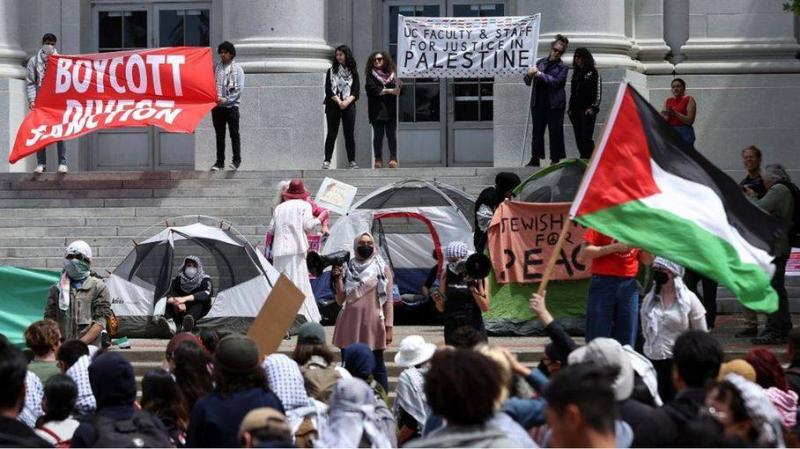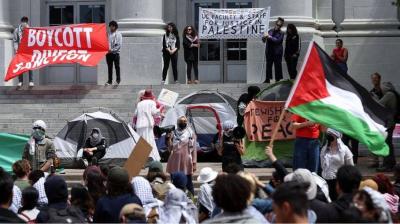Student protests in the United States over the war in Gaza have intensified and expanded over the past week, with several encampments now established at universities including Columbia, Yale, and New York. Several universities have called in police to arrest demonstrators. Students at universities where protests erupted issued calls for a permanent ceasefire in Gaza, an end to U.S. military aid to Israel, divestment from companies supplying arms and other firms benefiting from the war, and amnesty for students and faculty who faced disciplinary actions or expulsion due to protests.
#### Who Are the Protesters?
Pro-Palestinian protests have attracted students and faculty from diverse backgrounds, including both Islamic and Jewish religions. Among the organized groups are "Students for Justice in Palestine" and "Jewish Voice for Peace." The encampments have also featured interfaith prayers and musical performances, as well as a variety of educational programs. The organizers denied responsibility for any violence against pro-Israel demonstrators or support for it, though some Jewish students expressed feeling unsafe on campus and concerned about chants they perceive as antisemitic.
#### What Was the Authorities' Response?
University administrators and law enforcement took strict actions against the protests. Columbia University and its Barnard College suspended dozens of students participating in the protests. More than 100 demonstrators were arrested at Columbia after university president Minouche Shafik called the New York police to clear the camp, a day after testifying before a congressional committee. She noted that the camp violated rules against unauthorized protests. Yale police arrested over 60 demonstrators on Monday, stating they were given "multiple opportunities to leave and avoid arrest." The New York police reported that 120 individuals were arrested at New York University late Monday, citing that the demonstrators did not disperse and were "affecting the safety and security of our community."
#### What Is the Impact on Campus Life?
After holding all classes virtually on Monday, Columbia University announced that it would adopt a mixed learning system of in-person and virtual classes for the remainder of the semester. Shafik stated that she would not allow any group to disrupt the graduation ceremony. California State Polytechnic University, Humboldt, canceled in-person classes until Wednesday after students barricaded themselves in an administrative building, demanding the university disclose all ties with Israel and sever relations with its universities. The University of Michigan confirmed that it would allow free expression and peaceful protests during graduation celebrations in early May but would stop "significant disruptions" to studies.
#### How Are Political Leaders Responding?
Democratic President Joe Biden, who has been criticized by protesters for providing funding and arms to Israel, told reporters on Monday that he denounces "antisemitic protests" and "those who do not understand what is happening with the Palestinians." Former President Donald Trump, the Republican candidate for the 2024 elections, described the protests on campus as "chaotic."




